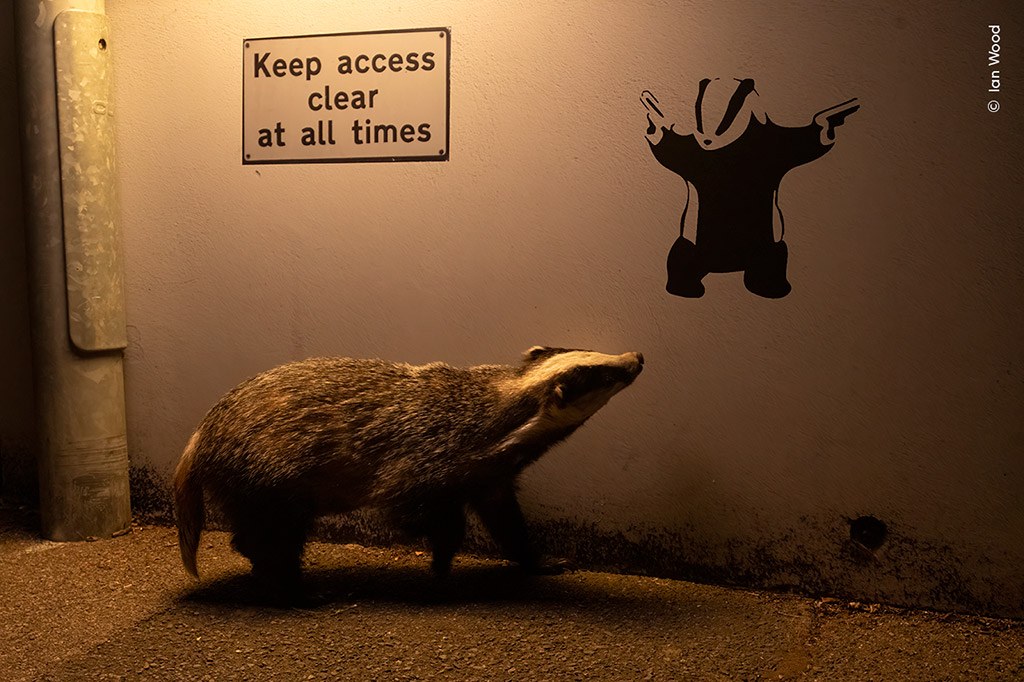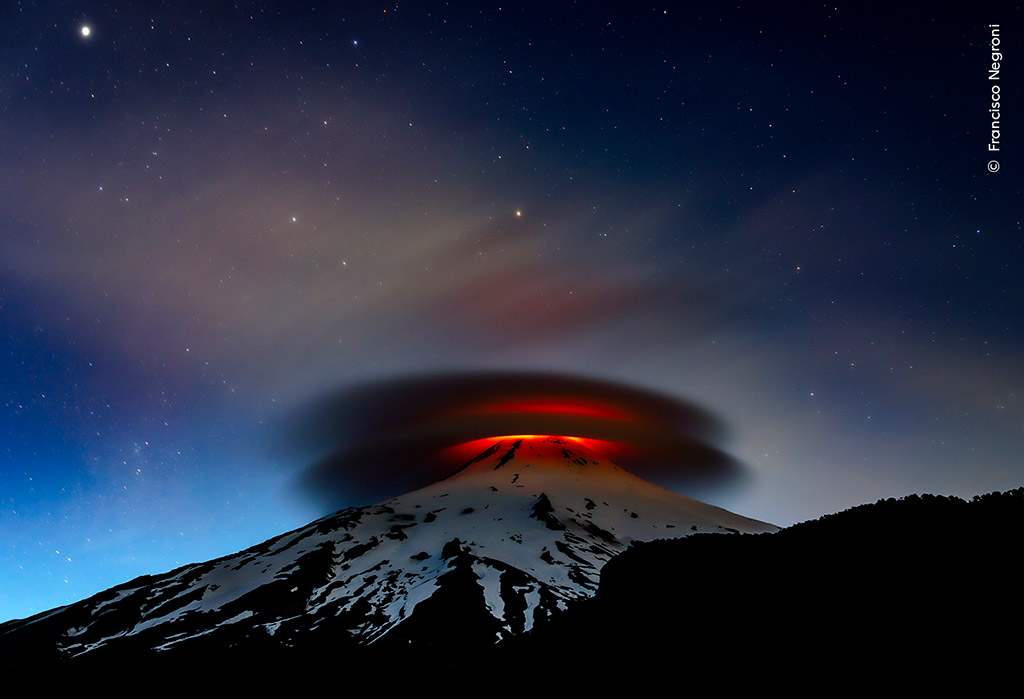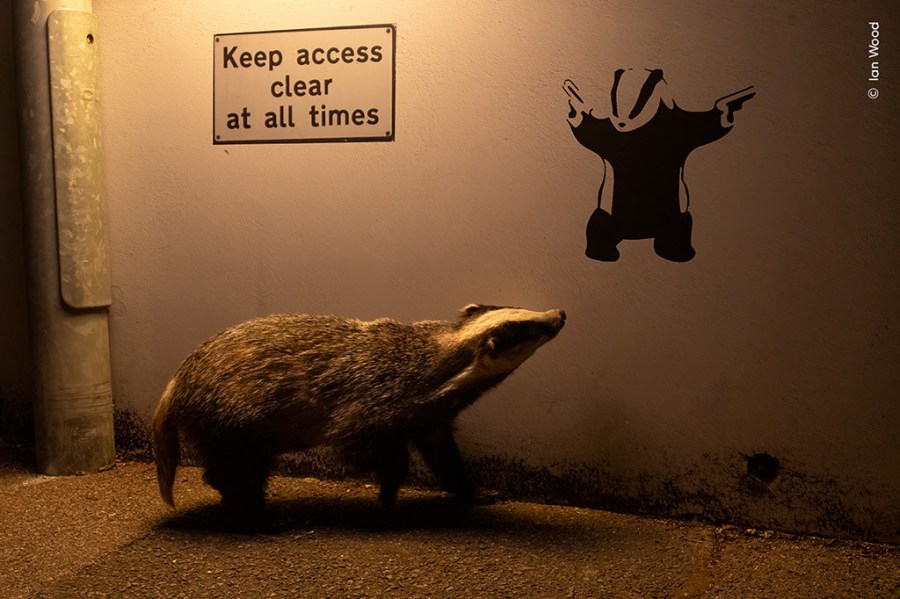Natural History Museum has revealed the winner of its Wildlife Photographer of the Year People’s Choice Award! British photographer Ian Wood has been named the winner of the 10th edition of the award from the flagship competition, with an image of a Eurasian badger looking at a piece of badger street art.
25 photographs were nominated for the award and after a record number of votes, Ian’s image came out on top. No Access presents a look into nature’s interaction with the human world and a reminder of our urban wildlife.
Wildlife Photographer of the Year People’s Choice Award winner
No Access by Ian Wood

An ambling Eurasian badger, illuminated by a streetlight, appears to glance up at badger graffiti on a quiet road in England, UK. Residents of St Leonards-on-Sea had been leaving food scraps on the pavement for foxes, but Ian noticed that badgers from a nearby sett were also coming to forage. After seeing a badger walking along the pavement by this wall late one night, he decided to photograph it. He set up a small hide on the edge of the road to take this picture.
From Natural History Museum: ‘No Access’, British photographer Ian Wood’s perfectly timed capture of an ambling Eurasian badger glancing up at some rather familiar graffiti in St Leonards-on-Sea, England, has won the tenth edition of the Wildlife Photographer of the Year People’s Choice Award 2024.
The 25 nominated images for this year’s Wildlife Photographer of the Year People’s Choice Award received a record number of votes with over 76,000 wildlife photography and nature fans from around the world voting for their favourite image.
Director of the Natural History Museum, Dr Douglas Gurr, says: “Ian’s flawlessly timed image offers a unique glimpse of nature’s interaction with the human world, underscoring the importance of understanding urban wildlife. His exceptional photograph serves as a powerful reminder that local nature and wildlife, often just outside our homes, can inspire and captivate us.”
After residents of St Leonards-on-Sea, England, had been leaving food scraps on the pavement for foxes, Ian noticed that badgers from a nearby sett were also coming to forage. Having seen a badger walking along the pavement by this wall late one night, he decided to photograph it and set up a small hide on the edge of the road to take his picture. Only the light from a lamppost illuminated the creature as it ambled along.
Ian says: “The outpouring of badger love since my photo was nominated for the People’s Choice Award has been beautifully overwhelming. Finding out that it has won is truly humbling. However, there is a darker side to this image. I live in rural Dorset where I’m on a re-wilding mission to enhance habitats for a huge array of wildlife. The badger cull – which is still ongoing – has decimated their numbers and I fear that unless the cull is stopped, we’ll only see badgers in urban settings in several parts of England. My hope is for this image to raise awareness of the damaging effect of the badger cull and help push for change.”

The four ‘Highly Commended’ images that also impressed wildlife lovers across the globe include ‘Earth and Sky’ by Francisco Negroni, an unforgettable capture of a double lenticular cloud illuminated at nightfall by lava emitted from the Villarrica volcano in Chile, and ‘Edge of
Night’ by Jess Findlay, an action shot showing a ghostly barn owl exiting through the hayloft window of a derelict barn to hunt.
The two other finalist images depict a stoat sitting up to observe its territory as it blends perfectly into a snowy landscape in Belgium in Michel d’Oultremont’s image ‘Whiteout’, and David Northall’s interesting capture ‘Spiked’ which shows a bloodied yet determined honey badger
returning to finish off a Cape porcupine, which had tried to defend itself earlier.
Ian’s image and the four finalist ‘Highly Commended’ images were selected from a shortlist of 25 images chosen by the Natural History Museum, London, and an international judging panel from almost 60,000 images submitted for the sixtieth Wildlife Photographer of the Year competition.

The five images will be displayed both online and on the interactive voting screens in the flagship exhibition at the Natural History Museum, London, on until 29 June 2025.
Wildlife Photographer of the Year shines a light on inspiring and impactful stories from the natural world to create advocates for our planet. The annual competition for amateur and professional photographers of all ages from around the world uses photography’s unique emotive power to connect people with nature.
Images entered into the sixty-first competition are currently being judged by an international panel of experts. The winners will be announced at the next annual awards ceremony which will take place at the Natural History Museum, London, in October 2025.
Further reading:
- Marrakesh silhouette street photo wins in Travel competition
- Stag beetle fight wins top prize in close-up competition
- Goodwood Revival photo wins Motorsport photography award!
- Best photography exhibitions to see in 2025
- Olympic surfer photo impresses again in top sports photography contest
- Portrait of Britain Vol.7 winning portraits light up the UK!







